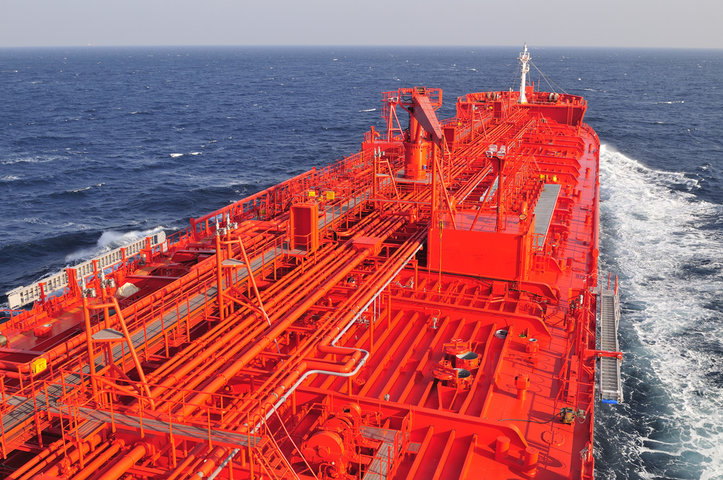Seaborne shipping has always been the most colourful element of global trade. In the 1870s the clipper Cutty Sark hoisted 32,000 feet of sail to speed the first teas of the season to London. It later outran even the newest steamers to ship wool between Australia and England, on one occasion taking just 73 days.
Today, global shipping is less romantic, but more important. Over 90% of international trade in goods is carried by sea.1 Always hostage to weather and fuel costs, the industry is also shaped by geopolitics. Yet it can be a good industry to invest in if the supply and demand dynamics are in your favour – and you choose the right company.
.jpg)
In October 2022, Platinum’s European Fund invested in TORM PLC, a Danish shipping company founded in 1889. TORM Plc is one of world's largest owners and operators of tankers that transport refined oil products and chemicals. It has been a standout performer.
Our investment case for TORM rests on four pillars.
Those changed trade patterns mean more revenue for the tanker industry. Typically a tanker from Russia takes 10 days to supply the EU, via the Baltic Sea. Now the EU needs the same volume of product but it comes from the Middle East or US – a round trip of over 25 days. This tightened capacity in the tanker industry. Shipping firms needed more vessels at sea, for longer, to carry the same volume.
That trend was exacerbated by Covid-19 when governments chose to restrict economic activity. The oil and gas industry couldn’t sustain loss-making refineries any longer, and opted to shut down some operations. Refineries representing nearly 1.5m barrels of European and US refined product capacity ceased operations for good. This sudden, significant drop in refining capacity meant European and US buyers needed to ship even more petrochemicals by sea.
IMO regulations also encourage vessels to run slower - a 10% cut in speeds saves over 25% in fuel costs and reduces emissions. But it means ships are at sea for longer – and can charge customers more.
They’re yet to emerge. While the industry is currently benefiting from changed industry dynamics it has vivid memories of over-adding capacity in the last cycle. Today, owners are hesitant to order newbuild ships except when replacing vessels set to be scrapped.
TORM Plc stood out as an operator with strong corporate governance, an efficient cost structure and a relatively young fleet. Like many companies in this boom-and-bust industry, TORM had been burnt in the past, taking on too much debt to build new tankers and then running into a protracted shipping downturn.
In 2015 TORM restructured with the help of Oaktree in a deal that cut debt in half and injected $100m into the company. Since then TORM Plc has operated prudently – only adding to the fleet where it improves total operating costs. They’ve also avoided taking on unnecessary debt to buy new ships and managed pricing astutely, refusing to sign absurdly low term-contracts when market conditions meant spot rates were more attractive.4
The longer that imbalance persists, the more valuable TORM’s tanker fleet becomes. Indeed we believe TORM’s asset values can continue to push higher while the company continues to pay dividends of more than 15% per year. That’s two good reasons for us to hold this stock.
1 Source: International Chamber of Shipping
2 Source: Factset, to 2/8/24, in local currency (Krone)
3 Source: Statistical Review of World Energy, 2024
4 Typically the shipping market hires vessels on spot or term rates.
Today, global shipping is less romantic, but more important. Over 90% of international trade in goods is carried by sea.1 Always hostage to weather and fuel costs, the industry is also shaped by geopolitics. Yet it can be a good industry to invest in if the supply and demand dynamics are in your favour – and you choose the right company.
.jpg)
In 2023, consumption of crude oil hit the 100 million barrels per day level for the first time ever (Energy Institute). That keeps a lot of ships at sea.
In October 2022, Platinum’s European Fund invested in TORM PLC, a Danish shipping company founded in 1889. TORM Plc is one of world's largest owners and operators of tankers that transport refined oil products and chemicals. It has been a standout performer.
-
Over the past year it returned +80%, including dividends.
-
Over the past five years it returned an average of +50% per annum, including dividends.2
Our investment case for TORM rests on four pillars.
1. Supply rerouted by geopolitics
Those changed trade patterns mean more revenue for the tanker industry. Typically a tanker from Russia takes 10 days to supply the EU, via the Baltic Sea. Now the EU needs the same volume of product but it comes from the Middle East or US – a round trip of over 25 days. This tightened capacity in the tanker industry. Shipping firms needed more vessels at sea, for longer, to carry the same volume.
2. A reshaped refinery network
That trend was exacerbated by Covid-19 when governments chose to restrict economic activity. The oil and gas industry couldn’t sustain loss-making refineries any longer, and opted to shut down some operations. Refineries representing nearly 1.5m barrels of European and US refined product capacity ceased operations for good. This sudden, significant drop in refining capacity meant European and US buyers needed to ship even more petrochemicals by sea.
3. Slow boats
IMO regulations also encourage vessels to run slower - a 10% cut in speeds saves over 25% in fuel costs and reduces emissions. But it means ships are at sea for longer – and can charge customers more.
4. No new competitors
They’re yet to emerge. While the industry is currently benefiting from changed industry dynamics it has vivid memories of over-adding capacity in the last cycle. Today, owners are hesitant to order newbuild ships except when replacing vessels set to be scrapped.
Why TORM?
TORM Plc stood out as an operator with strong corporate governance, an efficient cost structure and a relatively young fleet. Like many companies in this boom-and-bust industry, TORM had been burnt in the past, taking on too much debt to build new tankers and then running into a protracted shipping downturn.
In 2015 TORM restructured with the help of Oaktree in a deal that cut debt in half and injected $100m into the company. Since then TORM Plc has operated prudently – only adding to the fleet where it improves total operating costs. They’ve also avoided taking on unnecessary debt to buy new ships and managed pricing astutely, refusing to sign absurdly low term-contracts when market conditions meant spot rates were more attractive.4
Steady as she goes?
The longer that imbalance persists, the more valuable TORM’s tanker fleet becomes. Indeed we believe TORM’s asset values can continue to push higher while the company continues to pay dividends of more than 15% per year. That’s two good reasons for us to hold this stock.
- Like to know more about Platinum's European Fund?
- If you're considering international shares as an investment option, speak to your financial adviser. You can find more information on Platinum’s distinct approach to global share investing here.
1 Source: International Chamber of Shipping
2 Source: Factset, to 2/8/24, in local currency (Krone)
3 Source: Statistical Review of World Energy, 2024
4 Typically the shipping market hires vessels on spot or term rates.
Disclaimer
The above information is commentary only (i.e. our general thoughts). It is not intended to be, nor should it be construed as, investment advice. To the extent permitted by law, no liability is accepted for any loss or damage as a result of any reliance on this information. Before making any investment decision you need to consider (with your financial adviser) your particular investment needs, objectives and circumstances.



